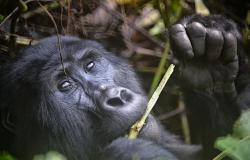
In times of human-inflicted ecological crises and the mass extinction of countless species, it becomes ever more urgent to redefine how we perceive ourselves and our relationship with the planet's ecosystems and other species. Indigenous cosmologies harbour perspectives fundamentally different from those of modern political and philosophical thought and might serve as guideposts for alternative visions. By looking at the on-going legal developments in the worldwide struggle for legal personhood for the great apes, this article argues that we are witnessing an unintended (but welcome) introduction of several aspects of indigenous cosmologies to modern political and legal thought. The animal rights movement has achieved a historic breakthrough when in 2016 an Argentine judge recognised the female chimpanzee Cecilia as a legal person. The article briefly summarises how over the last few decades scholars and animal rights movements have gradually questioned the main tenets of the human-animal divide. Thereafter, the article introduces what Brazilian anthropologist Eduardo Viveiros de Castro calls Amerindian perspectivism: a concept based on a distributive, situational and perspectivist relationship between humans and animals common in Amerindian cultures. Then, the article shows that the on-going redefinition of great apes as legal persons is reminiscent of key tenets of Amerindian perspectivism.
Policy recommendations
- Animal rights organisations worldwide should continue to challenge the status of the great apes as legal things in the court system of their countries.
- Judges worldwide should seek inspiration from indigenous thought and Amerindian perspectivism when deciding on cases that involve the potential granting of legal personhood to animals.
- Governments and international organisations should seriously consider the demands of animal rights organisations to integrate fundamental animal rights into national and international legislation.
- Scholars and governments, philanthropic foundations and other civil society organisations should invest in great ape sanctuaries as safe spaces for the great apes to live a life in dignity.
Photo Credit: Rod Waddington via Flickr (CC BY-SA 2.0)